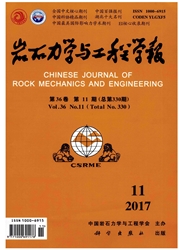

 中文摘要:
中文摘要:
结合工程实践,通过现场工程地质调查与勘探和室内外物理力学试验,采用数理统计分析方法和不平衡推力法,对碎石土的一般物理力学特性、渗透特性以及碎石土滑坡中地下水管网状排泄系统对滑坡稳定性和失稳破坏的作用机制进行分析和研究。结果表明,碎块石粒组的含量和以粉粒、黏粒为主的细粒土粒组的含量对碎石土渗透系数影响最大且最为显著,碎石土的渗透系数分别随土中碎块砾石粒组含量和小于0.1mm粒径的细粒土粒组含量的增加而呈自然指数增大和降低;碎石土滑坡中地下水管网状排泄系统对天然边坡的稳定起关键作用;当碎石土滑坡中地下水管网状排泄系统遭受破坏和堵塞时,地下水位将明显上升,从而使潜在滑面的孔隙水压力及下滑力明显增大,导致边坡稳定性系数极大地下降,甚至使边坡失稳解体破坏。
 英文摘要:
英文摘要:
By the site investigation and exploration of engineering geology, physico-mechanical tests in laboratory and field, adopting the analytic mathematic statistics and unbalanced-thrust method, with the concrete engineering practice of debris landslide, the general physico-mechanical characteristic and permeability of debris landslide, the influence of its groundwater pipe network drainage system(GPNDS) on its stability, and the action mechanisms of its instability and failure are researched and analyzed. The research results are as follows. First, the influences of the contents of block and broken stone grain-grade, and fine earth mainly made up of silt and clay grain on debris permeability coefficient are the biggest and most remarkable. Second, debris permeability coefficient increases and decreases in natural exponent, respectively, with its grain-grade contents of block, broken stone and gravel, and the fine earth with grain size less than 0.1 mm. Third, the GPNDS of the debris landslide takes crucial action on natural slope stability. Fourth, when the GPNDS of the debris landslide is destroyed and blocked, groundwater level will obviously rise to make the pore water pressure of potential slide plane and down-sliding force clearly increase, which will make the slope stability coefficient descend obviously, even result in slope instability, disintegration and failure to some extent.
 同期刊论文项目
同期刊论文项目
 同项目期刊论文
同项目期刊论文
 期刊信息
期刊信息
